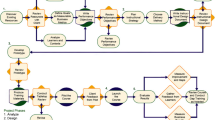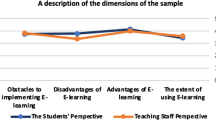Abstract
The neo-liberal reform of the university has had a huge impact on higher education and promises still more changes in the future. Many of these changes have had a negative impact on academic careers, values, and the educational experience. Educational technology plays an important role in the defense of neo-liberal reform, less through actual accomplishment than as a rhetorical justification for supposed “progress.” This paper outlines the main claims and consequences of this rhetorical strategy and its actual effects on the university to date.
Similar content being viewed by others
Notes
For more on this notion of divergent paths of development, see Feenberg (2012).
For an account of the development of this program, see Hamilton and Feenberg (2012).
Fortune Magazine, March 7, 1983.
See, for example, Lyotard (1984, 13).
For information on dropout rates, see https://www.insidehighered.com/news/2013/03/08/researchers-explore-who-taking-moocs-and-why-so-many-drop-out.
References
Feenberg, A. (2012). Between reason and experience. Cambridge: MIT Press.
Hamilton, E., & Feenberg, A. (2012). Alternative rationalisations and ambivalent futures: A critical history of online education. In Andrew Feenberg & Norm Friesen (Eds.), (Re)inventing the internet. Rotterdam: Sense.
Krieger, D. (2008). Measuring the unmeasurable (pp. 29–30). The Johns Hopkins Magazine.
Lyotard, J. F. (1984). The postmodern condition: A report on knowledge (G. Bennington & B. Massumi, Trans.). Minneapolis: Minnesota University Press.
Noble, D. (1998). Digital diploma mills: The automation of higher education. First Monday, 3(1). http://uncommonculture.org/ojs/index.php/fm/article/view/569/490.
Smith, A. (1960). The wealth of nations. London: Methuen and University Paperbacks.
Ure, A. (1835). The philosophy of manufactures. London: Charles Knight.
Author information
Authors and Affiliations
Corresponding author
Rights and permissions
About this article
Cite this article
Feenberg, A. The Online Education Controversy and the Future of the University. Found Sci 22, 363–371 (2017). https://doi.org/10.1007/s10699-015-9444-9
Published:
Issue Date:
DOI: https://doi.org/10.1007/s10699-015-9444-9




